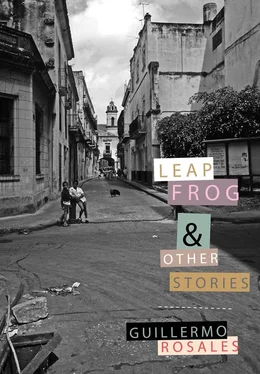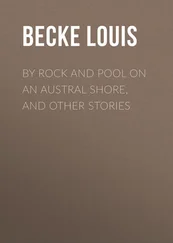There, I threw myself on the sand and leaned my head against a coconut tree. I didn’t have even one cent. I didn’t know where I was going to sleep in the days that followed, but I felt light, calm, almost happy.
O Pythagoras, Pythagoras! Keep me in mind when we see each other’s faces, there, in the afterlife.
Ferryman, oh, ferryman. Everything began because of that damned ferryman who was asking three thousand pesos to clandestinely take him out of the country.
“Three thousand, not one peso less,” the ferryman said, seated on the porch of his house, leaning against a wall decorated with revolutionary slogans, along with a picture of the tyrant Cornelio Rojas.
In his frustration, Danilo Castellanos had time to once again ponder the farce of a life that all of the country’s inhabitants lead. Nobody loved Cornelio Rojas, but in every house, like the ferryman’s, there were walls covered with revolutionary slogans and pictures of the dictator in a hundred different positions, in addition to a sign on every door that said, in brilliant letters, “This is your home, Cornelio.”
The ferryman, the man who had clandestinely taken more than five hundred people out on his shark fishing boat, gave the impression of being a loyal soldier to the dictatorship and the tyrant’s greatest admirer. “Three thousand, not one peso less,” the ferryman said again. And Danilo turned toward the street leading to the port, patting the paltry sixty pesos he had in his pocket. Three thousand; he needed three thousand. To wander the cafés of Paris, to get to know New York, to visit the Prado Museum in Madrid; to live like a free man for the first time in the thirty years he’d been alive. He walked toward the city. On every corner were enormous billboards with Cornelio Rojas’s face or those of the leading people in his government. Three thousand, three thousand. A legal ticket on an airplane would’ve cost a lot less, but Cornelio Rojas had forbidden all men under fifty years of age from leaving the country, due to military strategy and the agricultural need for strong arms and backs. Three thousand. Three thousand. Danilo sat down on a wall, in front of the sea, and began to sadly ponder ways to come up with three thousand pesos. His friends, teachers, and office workers lived day-to-day, like him, spending their paltry salaries on articles sold on the black market. His mother and father had died a long time ago. There was only his aunt Benigna, the aristocrat.
“Benigna is rich,” his mother had said to him before dying. “She must have over 20,000 pesos hidden away. But don’t ask her for one cent — don’t even try. She is the cheapest woman on earth.” And his mother added, “she doesn’t even keep the money in a bank. She hides it herself in the bathroom of her house, inside the wall, behind a blue tile below the sink.”
Aunt Benigna. She was the answer. He would go to her house in the neighborhood of Los Molinos, and he would cry, he would beg, he would kiss her feet so that she would lend him the money.
“None of that will do any good,” his mother had said. “My sister Benigna has a heart of steel. She could see you dying of hunger and still be incapable of feeling moved to give you one cent.”
Danilo Castellanos looked at the horizon over the sea for a long time. A ship with the French flag passed slowly before him with its prow headed toward freedom. He would steal. He would go see his aunt Benigna and would steal from her without hesitation the three-thousand pesos that the Ferryman required. Just three thousand; that way perhaps his aunt wouldn’t immediately notice it was missing. Yes, he would steal, and like the honest man he was, he would quickly return the money as soon as he was in the land of freedom. He stood up on the wall, contemplated the red ball of the sun that was sinking slowly into the sea, filled his lungs with salty air, and walked down the street toward the neighborhood of Los Molinos, one of the city’s most exclusive.
As he walked quickly, he pondered the steps he should take. His aunt would be surprised by the visit, after so many years without any word from him. But he would justify his absence by saying he was working as a history teacher in a town out in the countryside. He would smile, hug her, take her that orchid that bloomed in the funeral home’s garden. Then the difficult part would come; listening to his aunt, listening to the idiotic things she would say, and going through the enormous family album with her, containing all the photos of the grandparents, cousins, and childhood friends who were now dead or in exile. Then the crucial moment would come; the excuse for going to the bathroom. Diarrhea. That’s what he would say. He would feign strong stomach cramps and would ask the old lady if he could use her bathroom. There, below the sink, was the fortune. Three thousand. Just three thousand. And perhaps that same night, he would be on the Ferryman’s vessel, covered by a sheet, headed toward international waters, where a Swedish cargo ship or an American cutter or a Canadian cruise ship would take him to the land of freedom.
When he passed in front of the funeral home, he plucked the showy orchid. Then he climbed up the steep street that marked the edges of the exclusive neighborhood of Los Molinos, where the majority of the highest-ranking government officials lived. It was almost night already when he arrived at the three-story building where his aunt Benigna lived. There, more than anywhere else, the streets were full of red flags and the houses displayed full-color pictures of Cornelio Rojas with the slogan that had been read and heard a thousand times: Education, Production, Defense.
Danilo Castellanos took a deep breath before going up the stairs that would take him to the third floor. He wasn’t a criminal; he had never stolen and, until then, he had been a dignified history teacher, respected for his moral inscrutability and his far-reaching knowledge of Ancient Greece. But he had to escape. He had become so disenchanted with Cornelio Rojas’s revolution that he had a duodenal ulcer and a nervous tic in his eye, which made him especially insecure in front of women. He had to act. Caesar did far more to gain power. Without hesitation, he skipped up the forty steps and as if he were in a movie, saw himself knocking at the door marked number thirty-three, where the shameful sign also hung, announcing, “This is your home, Cornelio.” He didn’t have to wait long. From the other side of the door, came the voice of an old woman asking, “Who is it?”
And Danilo, waving the orchid, responded in an incredibly firm voice, “It’s me, auntie, your nephew Danilo.” A few tense seconds of waiting passed, and then the door opened slowly, allowing the old woman to show her mistrustful eye and study the visitor’s appearance. The yelling came right away, “Lord in Heaven above! Kid, it’s you! I haven’t seen you for years!”
The door opened completely and Danilo melted into a hug with that feeble body that smelled of castor oil and he felt a long, cold kiss on his ear that turned his stomach. She was ugly, wearing a house dress buttoned up to the neck and the skin of her arms and face appeared to be made of onion peel.
“Lord in Heaven above! Lord in Heaven above!”
“Aunt, auntie, you’re looking so well!”
“I’m an old lady about to kick the bucket. But you, son, you’ve become a man. The last time I saw you was at your mother’s wake.”
“I remember.”
“You’ve let me down, Danilo. You don’t even visit on my birthday. I bet you’ve forgotten the date on which your poor aunt was born.”
“Honestly, yes I have, auntie. But I haven’t completely forgotten you. I still remember how much you like orchids, and I bought you this one at the cemetery flower shop.”
Читать дальше












